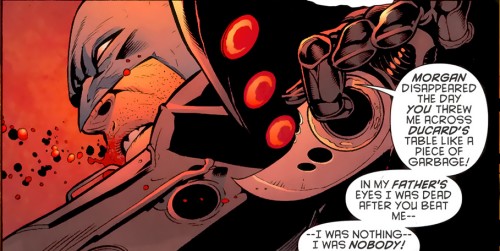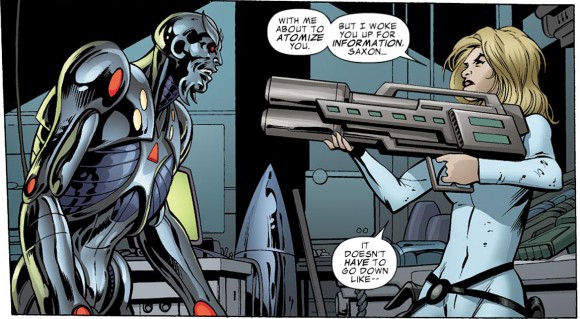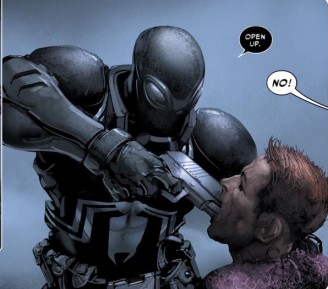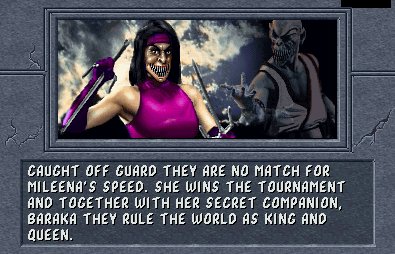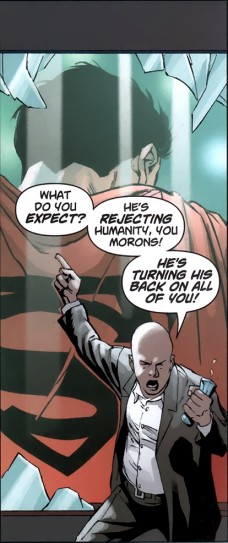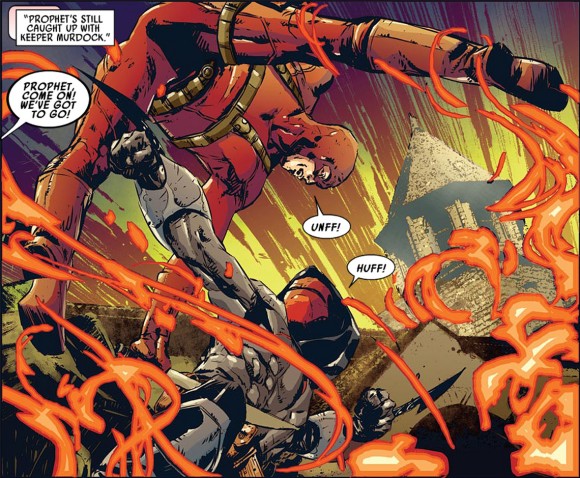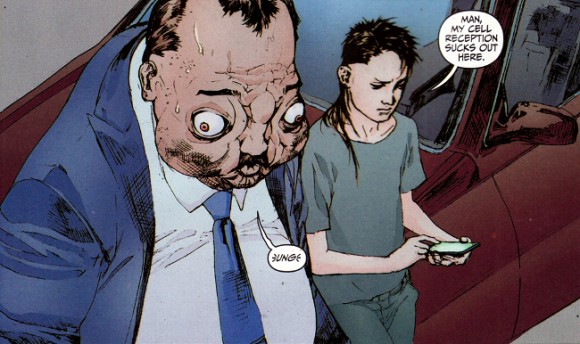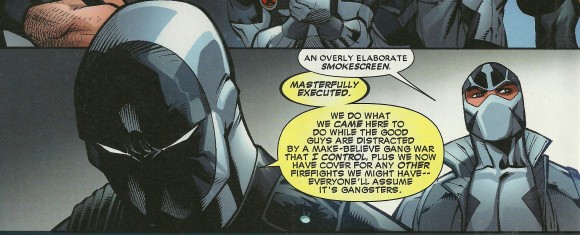
Brothers x Witzke: On How We Talk About Watchmen
March 19th, 2012 Posted by david brothersI had some thoughts about how we talk about Alan Moore and Dave Gibbons’s Watchmen after that last interview made the rounds. I think it’s about as good as everyone says it is, but I don’t agree that everything else is as awful in comparison. It’s a nebulous, annoying conversation to have, because there are so many variables to take into account–who’s saying it’s the best, what publishers allow creators to do, and on and on. Anyway, I wrote something up and emailed it to a few friends. Sean Witzke, supervillain, hit me with a response that I thought was really valuable. So, here: point/counterpoint, with David and Sean.

David: Alan Moore gave another interview, and that means that we’ve got another chance to think about how DC screwed him and how all modern comics suck and are just suckling at his literary teat even to this day. He’s upped the ante this time to saying that Watchmen, his masterwork with Dave Gibbons, is not only the best superhero comic ever and constantly ripped off, but single-handedly saved the comics industry, too, because the industry was in shambles in the early ’80s and then turned around after Watchmen came out. Which is demonstrably untrue, but whatever. More interesting is his idea that Watchmen is still the best cape comic ever.
You can’t really blame him for holding that position. Watchmen is a crystal of a comic book, self-reflective and reflective of our culture (at a certain point anyway) simultaneously. The writing is on point, the art is on point, and it’s a really good comic in general, no matter how I feel about the plot or whatever. It’s the real deal, and everyone’s said it over and over. So it’s no wonder that Moore looks at that book, and at what people have said about it, and at the current comics industry, and says what he says. Watchmen is the one comic, above all others, that gets the praise it does.
Watchmen is generally treated as Best Comic by the comics industry and its fans. It’s credited with moving cape comics past their genre roots, being a high watermark for cape comics, and the source of the brutality, ennui, and trauma that we think of whenever someone says the phrase “’90s comics.”

I don’t think any of these are strawmen that I’m setting up just to knock them down, either. Watchmen is consistently the one book that everyone (the generic, anecdotal everyone, so maybe this is a strawman, but I sure hope not) recommends to new readers or readers who want a bit of maturity. Watchmen was the only comic on Time’s Top 100 Novels list a few years back. When we look at the ’90s, you often hear that people “learned the wrong lessons from” or “missed the point of” Watchmen. Watchmen is a big deal, deservedly so, but I can’t help but feel like it is a bigger deal than it should be, if only due to received wisdom and a lack of a strong resource for comics history.
The Best Comic thing sticks in my craw the most, I think, because it’s such a fake idea. I can’t think of a Best Movie or Best Song, or even Best Western or Best Rap Song. It’s such a broad brush to paint a work, and therefore a genre, with that it doesn’t even make sense. No one out there is saying that anyone who watches movies absolutely has to watch Carol Reed’s The Third Man or Woody Allen’s Annie Hall. They might recommend those to you, but always as a part of a spectrum of must-watch films. “Oh yeah, watch this, that, this Kurosawa over here, and this De Palma once you finish that.” I like this wikipedia list of films considered the best, because it’s so diverse. The IMDB list is varied, too. I disagree with a lot of them (The Dark Knight is in the top ten?), but it’s still interesting to look at. I think it’s notable that no one film on this list has the same status amongst a broad subsection of movie fans (movie watchers? “people?”) as Watchmen does amongst comics fans. Ask ten people the best movie and you’ll get a variety of answers. Ask ten comics fans and probably at least half of them will say Watchmen. Why does Watchmen get the Best Comic treatment, other than being good?

Part of it is that Watchmen is the result of a conscious effort to make a literary comic. It’s not just about entertainment or ongoing adventures. It’s about competing with Moby Dick, or making a work intended to operate on that same level. Which is admirable, to be sure. The vast majority of cape comics are bent toward direct entertainment, which I think is also pretty admirable. But it has the effect of making Watchmen a stranger in a strange land. It’s got capes, but it’s exotic, too, because of that literary influence.
Conventional wisdom holds that Watchmen represents a watershed moment in comics, is partially at fault for the excesses of the ’90s, and is the peak of cape comics. You won’t find none better. I used to agree with that, more or less, but I don’t think I do any more. Watchmen wasn’t a quantum leap forward into a new context so much as it was another step in a road comics had already begun. It was step six, rather than an all-new step one. The idea of cape comics for adults, or cape comics that deal with heavy themes, had already been broached, most especially by Steve Gerber and several other cats working at Marvel in the ’70s. I feel like there’s this idea that Watchmen is the point when cape comics went from goo-goo ga-ga baby stuff to actual books adults could read — comic books blossomed into *~Graphic Novels~*, essentially. And that isn’t true, either.

You can track what led to Watchmen in cape comics, in pretty concrete terms, too, I’d argue. I’m far from an expert (an understatement), but you can find prior examples of the flawed in Lee & Ditko’s Peter Parker and Lee & Kirby’s Ben Grimm. You could look at several characters in Watchmen as examples of what happens when that flawed hero stops trying to be a hero. Rorshach is the opposite, even–he’s a hero who has no business being a hero, but keeps at it out of sheer hard-headedness.
The bleak miasma that gives Watchmen its tone, the sense of unrest and doom infests the book, feels very ’70s to me. That’s when Marvel was going hard with the idea of uncertainty and unrest, whether it was Luke Cage appropriating superhero iconography in order to escape a return to prison and make a buck or Spider-Man losing when it counts and not being able to do a single solitary thing about it. The Heroes for Hire area of ’70s Marvel, the Luke Cages and Shang Chis and Misty Knights, feels particularly relevant here, as their stories often dealt in moral ambiguity or a distrust of the establishment. Many of Marvel’s heroes were outlaws first, too, at least in the eyes of the public.
What I’m trying to say is that Watchmen is definitely a watershed moment, due mainly to the level of craft and approach that it brought to cape-based material, but it isn’t an unprecedented one, and I think that’s an important factor that we often leave out when we discuss Watchmen and its influence. If Watchmen never happened, I’d bet cash money that the ’90s, the ideal of the ’90s that most of us hold, would’ve still happened more or less as they did. The hallmarks of the ’90s, whether you’re talking pouches or grittiness or realism or whatever, were set in motion long before Watchmen happened.
The moral ambiguity, the physical and emotional trauma, the poison that hammered comics in the ’90s, all of that has its roots in the very beginning of the Marvel universe, when Stan and Jack and Steve and them were revolutionizing comics and making them cool again. They set comics down a road that inevitably leads to clones and crossovers and whatever else. There’s a logical progression from “Spider-Man screwed up, but now he tries harder” to “Spider-Man fails the love of his life and gets her killed” to “Spider-Man is a clone/crazy” to “Spider-Man is hardcore now.” It’s upping the ante on the flawed hero, bit by bit. The fallen hero and anti-hero are just another take on that same basic idea, which is itself another take on an even older idea.

Watchmen is very good, sure. It’s a high watermark for comics, but I don’t buy that it’s Best Comic. It deserves its place in the canon, it earned its place, but the highly elevated status we’ve given it is at least partially in error. It’s warped the conversation about the content of comics, the skill level, and comics history. It’s actually really frustrating to me, because I’m making an effort to go back and learn this stuff so I don’t put my foot in my mouth constantly, and Watchmen has twice the gravity of anything else. It’s hard to get around, and more than that, it’s hard to unlearn. Watchmen‘s GOAT status is a self-fulfilling prophecy, it feels like at this point.
Now that I’m done with this, I sorta feel like I’m saying “Watchmen is overrated.” That’s both not my point (in the sense of snarky dismissals) and my actual point at the same time (in the sense of taking a realistic look at comics history). Strange place to be.
Sean: Well, here’s the thing, though –there is a movie — Citizen Kane. And Watchmen totally is Citizen Kane, it’s the one work of art you have to reckon with, reconcile. Either disregard and burn down despite it’s legendary status (because its so boring, and so processed and its old and everyone who took from it took the wrong thing just like Watchmen) or realize that, yes, it is a masterpiece despite all those things.

I don’t know, you could also say that Pulp Fiction has a lot more similarities to Watchmen, because it spawned a million horrible tics and a million 70s references. So many bad tone deaf movies, but it also helped change the way movies were made and released. I mean, I just saw an interview with Paul Thomas Anderson where he said that Tarantino wasn’t an influence on Boogie Nights, but the reason he got to make it at all is because he was coming after Pulp Fiction.
I always think all the bad 90s grim and gritty hallmarks are so much like that. Because the ninjas and assassins and pouches and teeth, all of those things come from guys honestly making things they were interested in. They all became received wisdom, the way that Neal Adams and Gil Kane did for the previous generation. The 00s are a lot like the 80s, especially in comics, because there was such a rejection of the previous set of what is cool that it’s just knee-jerk “oh god 90s”. Which is kind of right, because there’s so much to be rightfully rejected, but in comics, everything was thrown out. Now the weirdest, worst things are all slipping back in from the 90s because we’ve got a good gap of time. There’s a reason that Dave Gibbons was playing with flat/exaggerated facial expressions, there’s a reason that Frank Miller was writing ninjas, because he wanted to write about honor, there’s a reason Moore wanted to discuss fascism with Steve Ditko’s iconography, there’s a reason Art Adams exaggerated gesture. I don’t think you can blame those guys for anything. All the people that came after them, yeah they fucked up. That’s not their fault. Anymore than it’s Moebius’ fault for Tron Legacy.

And beyond just Watchmen, there’s big works in all sorts of genre and media. There’s Moby Dick, there’s 7 Samurai, there’s Akira, and Pinnocchio, and Metropolis and the Twilight Zone, and The Godfather II, and Die Hard, and David Copperfield, and Illmatic, and Goodfellas, and the Searchers, and Star Wars, and I Robot – there’s all sorts of THE GRAND WORK in all sorts of media/genre, that you have to at least give your time, where if you’re going to take the genre seriously you have to give it your time because even if it isn’t the greatest thing you’ve ever been exposed to. Hopefully it isn’t, because if you have a certain level of tastes you’re going to have more personal preferences/ tastes — but you’ve got to reckon with that shit. If you like comics, you have to have really given Watchmen your time because of where it is in the medium, even if you fucking hate it. I hated Citizen Kane the first 3 times I watched it but I knew that I should keep giving it a chance. I’m not a Metallica guy, but I know that Master of Puppets is the “best” metal album.
Here’s the real thing that Watchmen did though, and I didn’t realize it until Abhay pointed it out for me. Watchmen said that you could take this material (superheroes, alternate reality stories) and tell a finite, complete story with it. There could be intertextuality and generational narratives and have legitimate minor characters, and actual consequences and politics. Stories, stories that matter, they have ends. And Watchmen is the first story that was taken to the real world (whether or not it was the first really doesn’t matter, the revolution starts when people notice fires in the street not when the plans are drafted) and said “oh yeah this stuff can actually work as a novel, it’s not just endless soap opera/pulp/sitcom that you can walk in and out of at any time because its an endless middle”. Making more Watchmen comics, as Abhay said, actually say that people were always right its just a garbage dump of endless dudes punching dudes, there’s no finite quality to anything. (I actually think the way trilogies are now par for the course in mainstream hollywood, and 6 season tv shows are doing the same thing to how people watch film and television). You’re right about Gerber and Stan And Jack – and shit, Miller and Moore both said that American Flagg was the reason they manned up and did Watchmen/Ronin, because it introduced real sophistication in a way that Marvel comics never ever ever did. Of course they’d both done Marvelman and Daredevil at that point, and it becomes all a gray morass of what happened first.

It doesn’t matter, no one outside of comics saw it. Watchmen they saw, and it was undeniable.
We’ve got to keep tearing it down so it can be replaced, because its still too big an icon, which actually paradoxically says a ton about how good the comic is. Comics as a whole needs to be able to say “fuck Watchmen” in a way beyond Grant Morrison’s shitty sniping in JLA: Earth 2, and I don’t know if we’re really at that point yet as a medium. I think the way that people are talking about/reacting to Moore isn’t the same thing, and Watchmen 2 really isn’t the same thing either, it’s wallowing in it rather than surpassing it.
Of course we know that Winter Men is the same story but better. But no one but us weirdos read it, it didn’t penetrate the culture. That’s important. Like, really important even though I could give a shit about ever getting anyone to read comics and actively try to avoid ever getting anyone “into” comics because i find evangelism disgusting. Great works, that shit matters, and no one with a brain is ever going to go “oh you liked Watchmen here read (whatever shitty comic people then recommend to people normally. Scalped, yeah Scalped is absolute shit that people like to read)”. No one goes “hey you liked Citizen Kane, you should see Dune“. Because no one starts with Citizen Kane, they have to watch it because it’s a monolith. If they like it or not is irrelevant. You shouldn’t start the film course with Eisenstein, you should have to work up to it. But you still have to cover it in the course, right?


